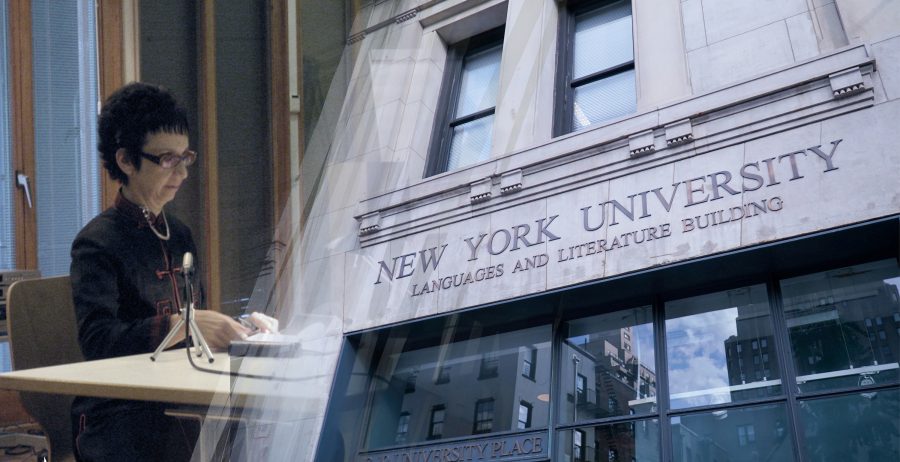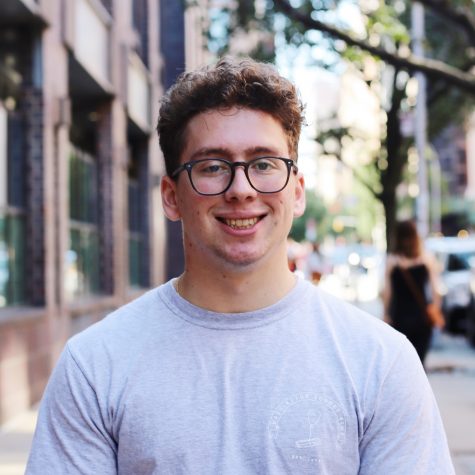NYU Professor Avital Ronell — who a Title IX investigation found guilty of sexually harassing a graduate student mentee — returned on Friday to a crowd of students and one security staffer outside of her classroom.
The students were not protesting, however, and the public safety officer was not there to monitor Ronell. Instead, eager students not enrolled in the class tried to sit in, and the security guard helped Ronell manage the surplus of interest, asking “Is there anything else you need?”
When approached by WSN reporters following the class, Ronell declined to comment for this article, citing a gag order. Students exiting the classroom ignored requests for comment.
But not everyone at NYU was happy to see Ronell return. Last semester, members of the Student Government Assembly asked that the Comparative Literature and German professor not be reinstated after an 11-month Title IX investigation conducted by NYU found she had sexually harassed her former doctoral mentee, Nimrod Reitman. This summer, NYU’s graduate student union started a petition — still in circulation — which asked the university to fire Ronell.
In a letter to the Graduate Student Organizing Committee, the university maintained that Ronell’s suspension, along with new guidelines on relationships between mentors and mentees, have been an adequate response. NYU also said that Ronell’s interactions with students will be monitored, although there was no sign of any university official inside the classroom with her on Friday.
“Speaking generally, though, the University responded promptly after hearing from the complainant; investigated the matter thoroughly; and the outcome included a substantial sanction and ongoing supervision,” university spokesperson John Beckman said in the statement.
In a statement made to WSN over the summer, NYU has asserted that it does not consider Ronell a threat to students. GSOC disagrees.
“[NYU is] literally permitting harassment,” GSOC steward for the Graduate School of Arts and Science Zach Rivers told WSN over the summer. “This is a permissive environment for harassment; there aren’t consequences.”
NYU responded to the initial allegations at the first University Senate meeting of the 2018-2019 year, when NYU President Andrew Hamilton asked Graduate School of Arts and Science Dean Phillip Brian Harper to examine aspects of the doctoral mentor and mentee relationship.
Harper said it was his idea to update the guidelines and maintains that it was not a direct product of the Ronell investigation. The new guidelines were drafted after listening sessions for faculty and doctoral students — during which they could express their thoughts on what the guidelines should look like — held during the fall 2018 semester.
Besides defining the roles of mentors and students, the guidelines emphasize that mentor-mentee relationships should operate under mutual respect and are strictly for the student to progress in their field of study.
Harper said he anticipates the guidelines will be expanded into a lengthy doctoral student mentoring handbook for all doctorate-granting schools at NYU, but did not specify a time frame.
Although the university has taken punitive action against Ronell, until further notice, she is still teaching “Theories of Grievance, Stuckness” to about six graduate students. GSOC maintains in its petition that this — Ronell’s return to all but normal teaching conditions, one year after being found to have sexually harassed a mentee by the university’s Title IX Office — is unacceptable, no matter the circumstances.
“NYU’s handling of the case suggests that its stated commitment to diversity and inclusion is nothing more than tokenism in place of actual institutional reform,” the petition reads. “Allowing Ronell to return to NYU demonstrates the university’s complicity in reproducing the structures that produce harassment and exclusion.”
A version of this article appeared in the Monday, September 9, 2019 print edition. Email Lisa Cochran and Victor Porcelli at [email protected].


























































































































































